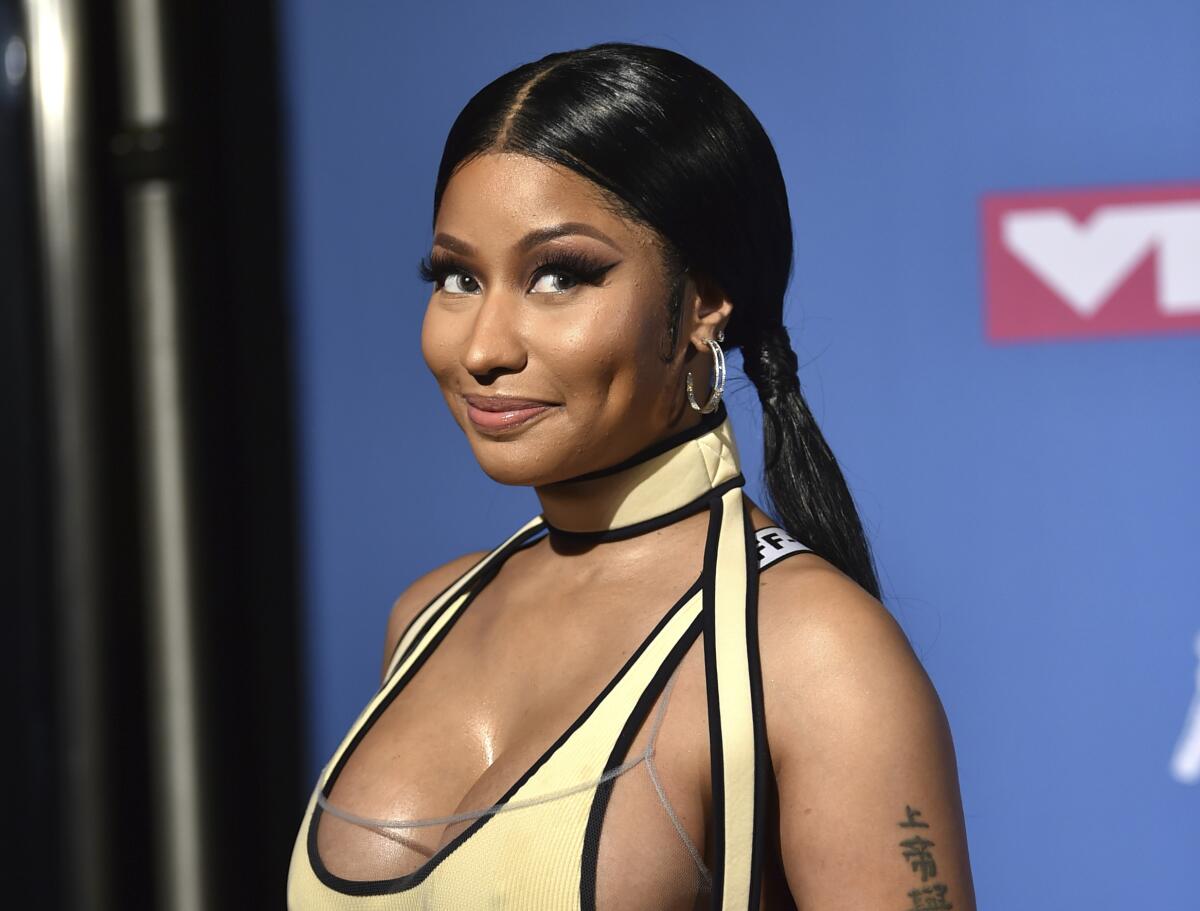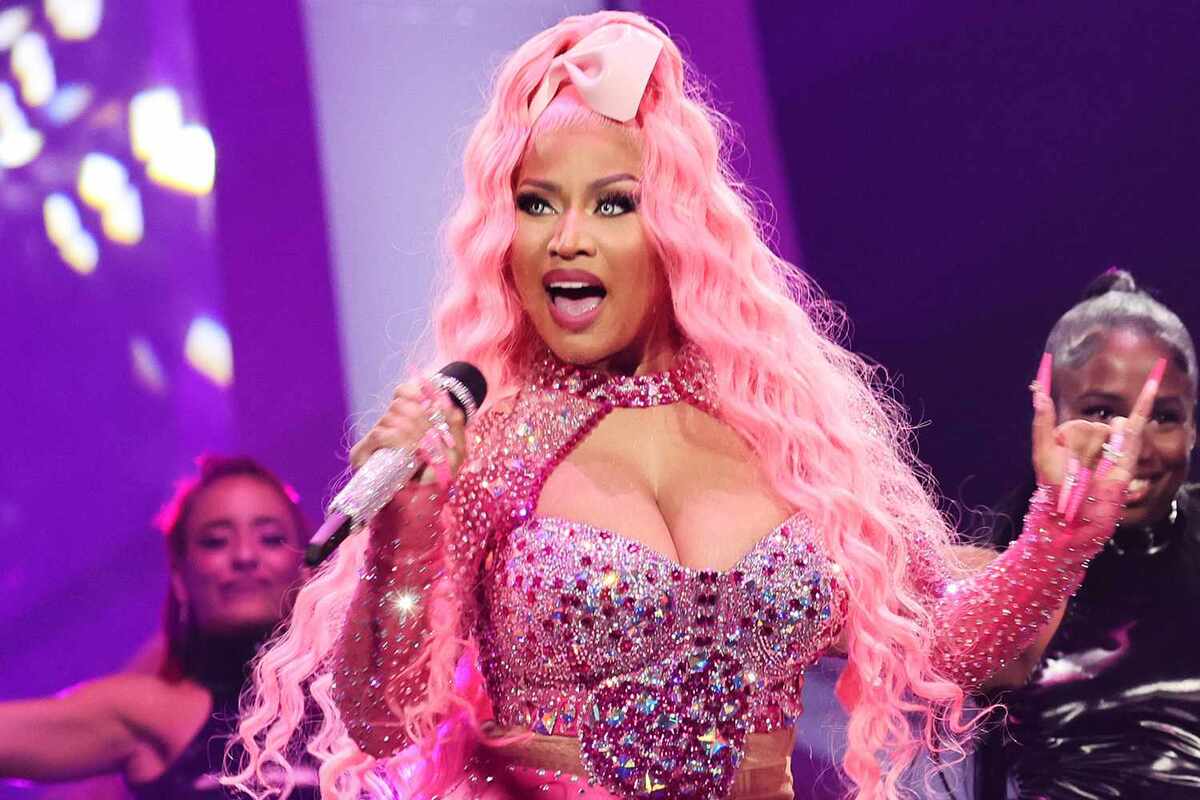Hip-hop icon Nicki Minaj has once again stirred conversation across the music industry and social media by boldly proclaiming herself the “Queen of Rap.” Known for her unapologetic confidence and impressive discography, Minaj’s statement came with an unexpected twist of humor. When asked what she planned to dress up as for Halloween, the rapper replied, “The same thing I was last year… The Queen of Rap.” This comment quickly circulated, sparking discussions about her place in hip-hop and reigniting debates about the ongoing rivalry among female rappers.
Here's ads banner inside a post
Nicki Minaj, one of the most successful female rappers in the world, has long been a prominent figure in hip-hop. As the artist behind hits like “Super Bass,” “Starships,” and “Anaconda,” she has achieved remarkable success, building a dedicated fan base, known as the “Barbz,” who are quick to defend her title. However, her statement also reopened discussions about her standing in the industry, especially since she has yet to win a Grammy despite being the best-selling female rapper in the world. Her Halloween comment and the Grammy saga are the latest in a long series of events that continue to fuel the debate about Minaj’s legacy as the Queen of Rap.
The Halloween Comment: A Bold Assertion or Lighthearted Fun?
Minaj’s Halloween response was both cheeky and self-assured, aligning with her long-established confidence in her rap career. For fans, the comment was a reminder of Minaj’s trailblazing influence in hip-hop, where she’s been one of the few female artists to break through the male-dominated industry. With over a decade of success, her music has consistently topped charts and her image remains iconic, with music videos like “Anaconda” and albums like Pink Friday setting standards in pop culture and music.
The comment, however, quickly sparked mixed reactions across social media. Many fans and fellow artists praised her confidence, echoing her sentiment that her contributions have reshaped the rap landscape. Some fans believe that her influence and track record firmly entitle her to the Queen of Rap title, celebrating her impact on the genre. Others, however, see the statement as a continuation of her competitive streak, especially given her often-publicized rivalries with other female rappers, including Cardi B, Megan Thee Stallion, and Remy Ma.
Here's ads banner inside a post
:max_bytes(150000):strip_icc():focal(809x109:811x111)/nicki-minaj-1-dc41c65d3d7a4c2e80ab129af0793b76.jpg)
Social Media’s Divided Reaction
Within hours, social media platforms like X (formerly Twitter) and Instagram were buzzing with reactions. Some fans embraced Minaj’s declaration as a deserved claim to the throne, noting her enduring relevance in a genre where artists often have short-lived careers. “Nicki’s rightfully the Queen of Rap,” one fan tweeted. “Her influence and the doors she’s opened for female rappers can’t be denied.”
Meanwhile, others felt that Minaj’s confidence sometimes crosses into arrogance, especially as the debate over the Queen of Rap title has stirred tension within the female rap community. Critics pointed out that hip-hop is now more diverse than ever, with artists like Cardi B, Megan Thee Stallion, and Doja Cat achieving significant milestones, challenging the notion that there’s room for only one “queen.” Some argued that Minaj’s statement could be seen as dismissive of the newer generation of female rappers who have built their own followings and made valuable contributions to the genre.
Here's ads banner inside a post

The Longstanding Rivalries in Female Rap
The question of who holds the title of the Queen of Rap has long been a source of friction among female rappers. Throughout her career, Minaj has been embroiled in high-profile feuds with other artists, with fans often taking sides and adding to the controversy. Her rivalry with Cardi B is perhaps the most famous example, culminating in a physical altercation at the 2018 New York Fashion Week. The incident underscored the intensity of the rivalry, with both fanbases standing firm in defense of their idols.
The competitive nature of female rap has only grown as more women enter the industry and achieve success. Today, female rappers are celebrated for their versatility, with many bringing unique styles and voices to hip-hop. Minaj’s declaration could be seen as a response to the increasing presence of female artists who are reshaping the genre, though some argue it’s part of the natural evolution of hip-hop.

Nicki Minaj’s Grammy Disappointment: A Long-Standing Frustration
One of the more significant points fueling the debate around Minaj’s claim is her Grammy history—or rather, her lack thereof. Despite her record-breaking sales, influence, and fanbase, Minaj has never won a Grammy. Earlier this year, Minaj believed she had finally received the coveted award when the official X account of the Recording Academy mistakenly tweeted that her collaboration with Ice Spice on the track “Barbie World” had won Best Rap Song. The tweet was quickly deleted, and a corrected announcement confirmed that the winner was Killer Mike’s “Scientists & Engineers.”
The incident left Minaj visibly disappointed, and fans took to social media to express frustration with the Recording Academy, questioning why such a prominent artist had been overlooked throughout her career. Many argued that the mistake was a disrespectful oversight and reinforced their belief that Minaj has been snubbed by the Grammy Awards for years. The mix-up reignited conversations about the Recording Academy’s track record with hip-hop and Black female artists, with fans asserting that Minaj’s contributions to the genre have been unfairly disregarded.
:max_bytes(150000):strip_icc():focal(753x176:755x178)/nicki-manaj-tout-121123-tout-b0a18c2729ba4e21a511aff95126f1b3.jpg)
Why Hasn’t Nicki Minaj Won a Grammy?
The absence of a Grammy in Minaj’s career remains one of the more baffling aspects of her legacy. With countless chart-topping hits, collaborations with major artists, and a distinct style that has influenced an entire generation, Minaj’s lack of Grammy recognition seems disproportionate to her impact. Some speculate that her outspoken personality and history of industry feuds may have contributed to her exclusion. Others believe that the Recording Academy’s biases and inconsistencies in recognizing hip-hop artists, especially women, have played a role.
Despite her Grammy setbacks, Minaj’s success as a best-selling female rapper and her millions of fans worldwide have solidified her position in the music industry. Her legacy goes beyond awards, but the repeated Grammy snubs remain a sore spot for both her and her fanbase. Minaj has previously voiced her frustration with the Recording Academy, pointing out the double standards and disparities that artists like her face.

The Legacy of Nicki Minaj: Queen of Rap or Just One of Many?
The declaration of being the “Queen of Rap” is not new for Minaj, as she has referred to herself as such numerous times. However, this recent proclamation comes at a time when the female rap landscape is broader than ever. Artists like Cardi B, Megan Thee Stallion, Doja Cat, and Lizzo have entered the scene with remarkable success, challenging the notion of a singular title and creating space for multiple female rappers to thrive.
For her supporters, Minaj’s assertion is valid given her groundbreaking contributions and the barriers she has broken for female rappers. Minaj’s body of work and consistent chart success, they argue, are what set her apart. Her influence is evident in the increasing number of female rappers entering the industry, many of whom cite her as a major inspiration.
However, some argue that Minaj’s insistence on the Queen of Rap title may overshadow the contributions of other female rappers. In an era that celebrates diversity, some fans believe that hip-hop no longer needs a single “queen” but rather a pantheon of influential voices.

A Polarizing Icon
Ultimately, Nicki Minaj’s Halloween declaration has added another chapter to her storied career. As a polarizing icon, she has always walked the line between admiration and controversy. Her confidence and bold self-proclamations have made her both loved and criticized, embodying the fearless attitude that hip-hop is known for. Minaj’s legacy as a trailblazer in hip-hop is undeniable, but the debate over her self-proclaimed title as the Queen of Rap reflects a larger conversation about the role of women in the genre.
Minaj’s journey, marked by highs and lows, feuds and triumphs, is a testament to her resilience in an industry where female rappers often face additional scrutiny. For her fans, her Queen of Rap claim is more than a title—it’s a statement of strength, persistence, and defiance.

Nicki Minaj’s latest declaration may be playful, but the response it has sparked is anything but. For some, she remains the Queen of Rap, a title earned through years of dedication, talent, and influence. For others, her claim feels outdated in an era that has seen a broader representation of women in hip-hop, challenging the very notion of a single queen.
As Minaj continues to shape her legacy, her journey will likely inspire future generations of artists, both male and female. While her Grammy saga serves as a reminder of the industry’s biases, her influence transcends awards. Whether fans agree with her Queen of Rap title or not, Nicki Minaj’s place in hip-hop history is cemented, and the ongoing debate only serves to highlight the impact she’s had on the genre. For Minaj, the crown may be contested, but her confidence in her title remains unshaken.

